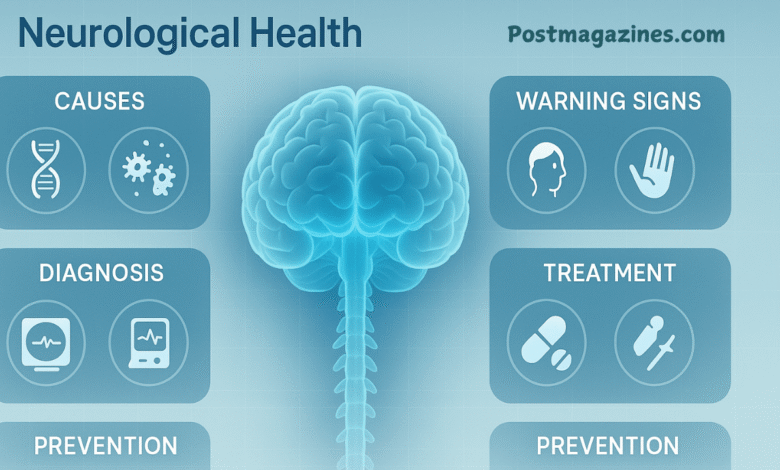doctorhub360.com Neurological Diseases: Causes, Warning Signs, and Preventive Measures

Introduction to doctorhub360.com Neurological Diseases
The human nervous system is one of the most complex and vital networks in the body, controlling every thought, movement, and sensation. When this system faces disorders, the effects can be life-altering. doctorhub360.com neurological diseases is a term that highlights the wide range of conditions affecting the brain, spinal cord, and peripheral nerves. From common issues like migraines to severe disorders such as Parkinson’s disease or multiple sclerosis, understanding these conditions is key to early detection and proper management. This article examines the various aspects of neurological diseases, including their causes, symptoms, diagnostic methods, treatments, and lifestyle recommendations, as presented on doctorhub360.com. Whether you are a patient, caregiver, or health enthusiast, this comprehensive guide aims to bring clarity and awareness.
What Are doctorhub360.com Neurological Diseases?
The doctorhub360.com neurological diseases refer to disorders that impair the functioning of the central and peripheral nervous systems. These include the brain, spinal cord, and the vast network of nerves throughout the body. Neurological conditions can be acute (sudden onset) or chronic (long-lasting), and their impact varies from mild sensory disturbances to severe impairments in movement, cognition, or sensation.
Common categories include:
- Neurodegenerative diseases such as Alzheimer’s disease, Parkinson’s disease, and Huntington’s disease.
- Autoimmune neurological disorders like multiple sclerosis and myasthenia gravis.
- Cerebrovascular conditions, including stroke and transient ischemic attacks (mini-strokes).
- Infectious neurological diseases caused by bacteria or viruses, such as meningitis or encephalitis.
- Headache and pain disorders like migraines and cluster headaches.
By visiting doctorhub360.com neurological diseases resources, readers can explore detailed explanations of each condition and their medical implications.
Causes and Risk Factors of doctorhub360.com Neurological Diseases
Neurological disorders emerge from a variety of causes, and the exact risk factors differ for each condition. Some common causes include:
- Genetic factors – Mutations or hereditary predisposition can lead to conditions like Huntington’s disease or certain forms of epilepsy.
- Traumatic injuries – Head trauma from accidents or sports injuries can cause lasting neurological damage.
- Infections – Viral or bacterial infections, such as meningitis, can directly affect the nervous system.
- Autoimmune responses – The immune system may mistakenly attack nerve cells, as seen in multiple sclerosis.
- Vascular problems – High blood pressure, atherosclerosis, or blood clots may lead to strokes.
Recognizing these risks is crucial. doctorhub360.com neurological diseases guides often emphasize early screening and preventative measures to reduce the likelihood of severe complications.
Common Symptoms of doctorhub360.com Neurological Diseases
While symptoms vary depending on the specific disorder, several common warning signs signal potential neurological problems:
- Persistent or severe headaches
- Numbness or tingling sensations
- Weakness or loss of muscle strength
- Vision disturbances or sudden blindness
- Memory loss, confusion, or cognitive decline
- Difficulty with speech, balance, or coordination
- Seizures or sudden episodes of loss of consciousness
The presence of these symptoms warrants immediate medical attention. As highlighted in doctorhub360.com neurological diseases resources, early diagnosis can make a dramatic difference in treatment outcomes.
Diagnostic Approaches for doctorhub360.com Neurological Diseases
Diagnosing neurological conditions requires a combination of clinical evaluation and advanced technology. Standard diagnostic procedures include:
- Neurological examination – Assessing reflexes, muscle strength, coordination, and cognitive abilities.
- Imaging techniques, including MRI, CT scans, and PET scans, aid in visualizing brain structures and detecting abnormalities within the brain.
- Electrodiagnostic tests – EEGs and EMGs record electrical activity in the brain and muscles.
- Laboratory tests – Blood and cerebrospinal fluid analysis can reveal infections or autoimmune markers.
Through these methods, healthcare professionals can identify the type and extent of neurological damage. Many doctorhub360.com neurological disease articles stress the importance of accurate testing for tailored treatment plans.
Treatment Options for doctorhub360.com Neurological Diseases
Managing neurological disorders often requires a multidisciplinary approach. Treatments may include:
- Medication – Drugs for controlling symptoms like seizures, pain, or inflammation. For example, dopaminergic medicines for Parkinson’s disease or anticonvulsants for epilepsy.
- Surgery – Procedures such as deep brain stimulation or removal of tumors may be necessary for specific conditions.
- Physical and occupational therapy – Rehabilitation helps patients regain lost motor skills or adapt to disabilities.
- Lifestyle interventions, including nutrition, exercise, and stress management, can complement medical care.
- Psychological support – Counseling or therapy to address anxiety, depression, or cognitive changes.
According to doctorhub360.com neurological diseases resources, combining medical and lifestyle approaches yields the best results for most patients.
Living with doctorhub360.com Neurological Diseases
Coping with a neurological disorder often involves long-term adjustments. Key strategies include:
- Building a strong support network of family, friends, and caregivers.
- Following a regular treatment and therapy schedule.
- Staying informed through reputable sources like doctorhub360.com neurological diseases updates.
- Using assistive devices or home modifications to maintain independence.
These steps help patients preserve quality of life and adapt to challenges with resilience and confidence.
Preventive Measures and Early Intervention
While not all neurological conditions are preventable, confident lifestyle choices can reduce risks:
- Maintaining a balanced diet rich in omega-3 fatty acids and antioxidants.
- Engaging in regular physical activity promotes healthy blood flow.
- Managing chronic illnesses such as diabetes or hypertension.
- Wearing protective gear to avoid head injuries.
- Scheduling regular checkups and neurological assessments when risk factors exist.
Early intervention, as emphasized by doctorhub360.com neurological diseases resources, can delay disease progression and improve outcomes.
Conclusion: The Importance of Awareness and Care
Understanding doctorhub360.com neurological diseases is essential for patients, caregivers, and the broader community. Neurological disorders can affect anyone, regardless of age or background, and their impact is profound. By recognizing symptoms early, seeking an accurate diagnosis, and following evidence-based treatments, individuals can significantly enhance their chances of maintaining a healthy and fulfilling life.
You My Also Read: Acibadem Health Point Knee Replacement: Advanced Solutions for Your Joint Health




